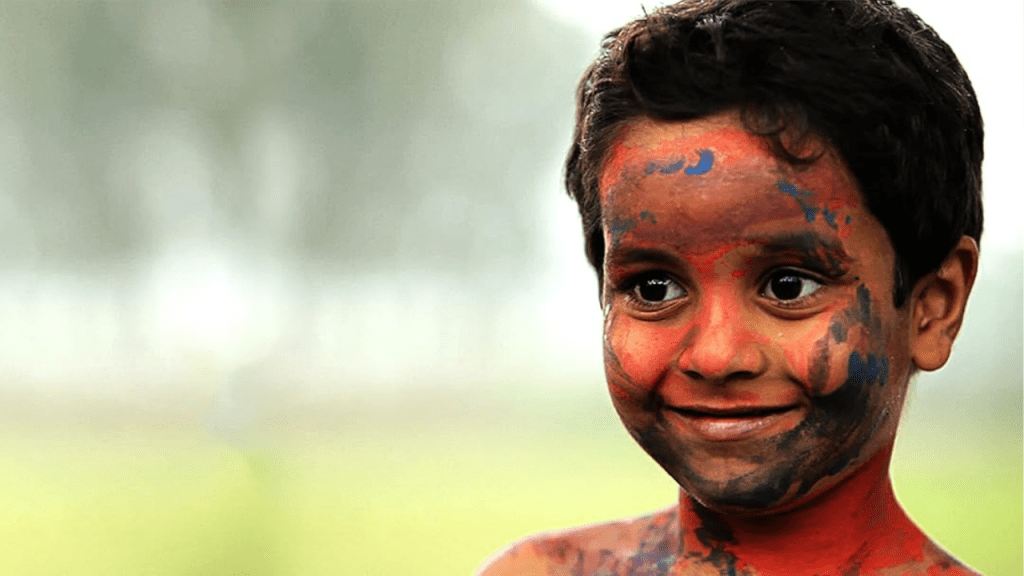Language: Hindi
Age Rating: U
Genre: Slice-of-Life, Drama, Family
Released in Theatres: May 30, 2025
Director Mehran Amrohi’s Chidiya is a gentle, uplifting story rooted in the gritty reality of Mumbai’s chawls, where dreams often take a backseat to survival. But what happens when two young boys dare to dream anyway? In this Chidiya movie review, we explore how the film combines emotional authenticity, community spirit, and subtle storytelling into a memorable cinematic experience.
Plot: Two Brothers, One Dream, Many Hurdles
At the heart of Chidiya are Shanu (Svar Kamble) and Bua aka Bhuvan (Ayush Pathak), two young brothers navigating life after the sudden loss of their father. Their mother Vaishnavi (Amruta Subhash) works tirelessly as a saree tailor, while the boys assist her by delivering garments across the locality. The cramped chawl they call home offers little space, both physically and metaphorically, to nurture their growing passion for badminton.
Their world shifts when they begin working as spot boys on a film set—a job secured through their caring uncle Bali (Vinay Pathak), also in the same profession. With odds stacked against them, the boys piece together a makeshift badminton court with the help of locals, sowing the seeds of joy and resistance. What unfolds is not just a tale of aspiration but one of community-driven hope.
Performances: Pure, Powerful, and Poignant
One of the standout aspects of Chidiya is the phenomenal casting.
- Svar Kamble and Ayush Pathak deliver organic, unfiltered performances that capture the innocence and persistence of childhood. Their chemistry as siblings feels lived-in, making their journey even more engaging.
- Amruta Subhash steals the show with her layered portrayal of a grieving mother who suppresses her own pain to protect her children. A highlight is the emotionally fraught scene where she sends her sons away for an out-of-town film shoot.
- Vinay Pathak brings charm and warmth to his role as Uncle Bali—a guiding light and comic relief wrapped in one.
- Inaamulhaq, as the cheeky yet lovable tailor Taj, and Brijendra Kala, as the tea vendor at the film set, round out the ensemble with well-timed wit and grounded realism.
Direction and Tone: Soft, Steady, and Soulful
Mehran Amrohi’s direction is gentle yet focused. He avoids the traps of melodrama and over-sentimentalism, instead choosing to spotlight the small, beautiful victories in an underdog story. Chidiya never loses its emotional core, even when portraying the economic and emotional turbulence the characters face.
The tone remains optimistic throughout, reminding audiences that even amid hardship, there is room for laughter, play, and kindness. From repurposed sari threads to build a badminton net to neighbours helping light up the court at night, every moment is stitched with care and realism.
Cinematography and Music: Simple, Yet Stirring
While Chidiya doesn’t boast extravagant visuals, the cinematography captures the intimacy of chawl life with honesty. The compound court, crowded lanes, and film sets become characters in themselves, reflecting the socio-economic ecosystem that the boys must navigate.
The background score is minimalistic, allowing moments of silence and natural sounds to build emotional weight. Music is used sparingly, enhancing the narrative without overpowering it.
Check Out: First Song from Internationally Acclaimed Film Chidiya Released Ahead of May Theatrical Launch
Strengths and Shortcomings
What Works:
- Outstanding performances by the child leads and supporting cast
- Emotionally grounded storytelling with universal themes
- Positive portrayal of community and childhood resilience
- Uplifting tone despite serious subject matter
Where It Stumbles:
- Some secondary characters could use more depth
- Slightly slow build-up in the first half
Cultural Relevance and Social Impact
As highlighted in this Chidiya movie review, the film touches on the silent sacrifices made by working-class families and children robbed of carefree childhoods. It gently critiques the system without direct confrontation—offering instead a solution rooted in collective compassion. The movie celebrates the idea that when people support each other, even modest dreams can take flight.
Chidiya is particularly relevant in today’s era of fast-paced, materialistic storytelling. It dares to pause, breathe, and remind us of the joys of simpler things—a game, a shared meal, a patch of open space.
Final Verdict: ⭐️⭐️⭐️⭐️ (4/5 Stars)
To conclude this Chidiya movie review, the film is a soulful reminder of how courage and kindness can sprout even in the tightest of corners. It’s not just a story about two boys who want to play badminton—it’s about everyone who ever dared to dream with limited means.
Whether you’re a fan of slice-of-life dramas or simply in search of a film that leaves you smiling through tears, Chidiya is a must-watch.
Should You Watch It?
Yes. Chidiya is perfect for audiences who appreciate stories of quiet triumphs, rich emotional depth, and deeply human characters. It’s an ode to childhood, family, and the beautiful chaos of everyday life.
